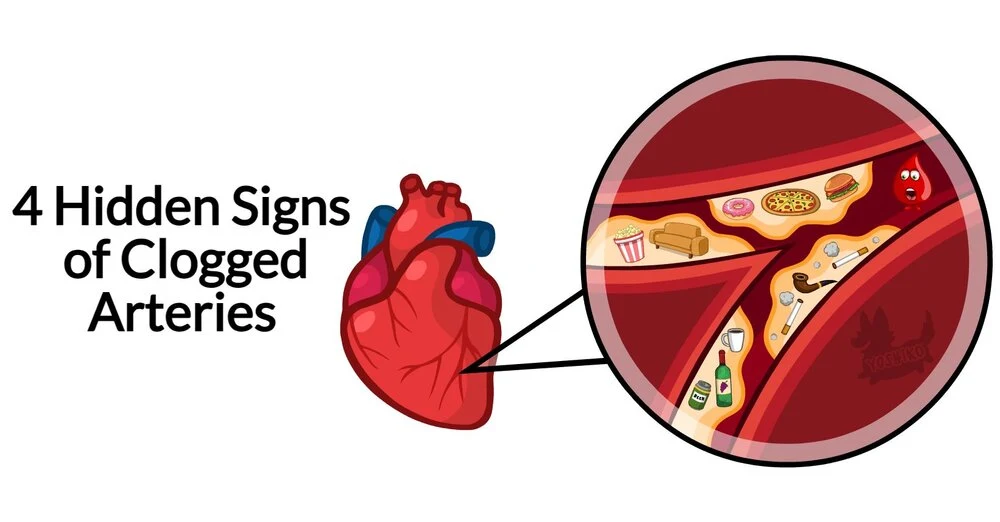Maintaining our health can be challenging, particularly in today's fast-paced environment where opting for unhealthy meals is often the quickest option. Regrettably, such dietary choices can lead to clogged arteries. You might believe your health is in excellent condition, but it's possible to have clogged arteries without realizing it.
So, what are clogged arteries exactly?
WebMD states, "Clogged arteries occur due to the accumulation of a substance known as plaque on the inner walls of the arteries. Arterial plaque can diminish or sometimes completely obstruct blood flow. Clogged arteries significantly increase the risk of heart attack, stroke, and even death."
Begin by familiarizing yourself with the subtle signs of clogged arteries that might go unnoticed, and then discover the best types of food to eat to prevent this condition.
4 SUBTLE SIGNS OF CLOGGED ARTERIES
1. UNEXPECTED BALDNESS
Regardless of age, a study involving 37,000 men indicated that baldness at the crown of the head could suggest the presence of Coronary Heart Disease (CHD), while another study of 7,000 individuals, including 4,000 women, found that moderate to severe baldness increased the risk of death from heart disease in both genders. Balding may seem familial, but it could also indicate clogged arteries leading to heart disease.
WebMD states that the biological connection between hair loss and heart disease might involve high levels of male hormones. The scalp contains a dense number of male hormone receptors, and elevated hormone levels, such as testosterone, are linked to an increased risk of arterial hardening and blood clotting.
If you're experiencing moderate to severe balding, it's advisable to seriously consider your diet and health, as it could be your body signaling the need for change.
2. PAIN IN YOUR CALVES
Pain in the calves, known as "claudication," particularly during walking, can be a symptom of atherosclerosis, which may cause arterial blockages before CHD becomes apparent, especially in smokers. If you experience calf pain while walking without a clear cause, such as a recent intense workout, it's important to have it evaluated promptly.
A physician will measure blood flow and pressure to determine if there is poor circulation. This assessment can help identify heart issues and clogged arteries early, preventing further damage.
3. CREASE IN YOUR EARLOBE
Earlobes are often overlooked, but for individuals with Coronary Heart Disease (CHD), a crease running from the ear canal to the lower part of the earlobe may be a sign of poor blood circulation due to clogged arteries.
Joel K. Kahn, MD, a clinical professor of medicine, notes that while some argue an earlobe crease is merely a sign of aging, recent sophisticated CT scans measuring silent CHD suggest that an ear crease can predict heart disease, independent of other risk factors like age and smoking.
Noticing such a crease warrants a medical assessment for heart issues or artery blockage.
Erectile Dysfunction (ED) can also signal clogged arteries. While age can contribute to ED, for younger men who should not have difficulty achieving an erection, ED can indicate clogged pelvic arteries, reducing blood flow to the penis. Diagnosis of CHD often follows 3 to 5 years after initial signs of ED, providing a window for medical evaluation and discovery of artery blockage.
Recognizing signs of clogged arteries is crucial for timely medical intervention. Equally vital is knowing which foods to consume to help prevent artery blockage.
Here are four of the best foods to prevent clogged arteries:
"It is health that is real wealth and not pieces of gold and silver." – Mahatma Gandhi
1. FRESH VEGETABLES
Eating vegetables is crucial, and always has been. There's a reason parents insist on their children eating veggies. Plant foods are rich in minerals, fiber, and vitamins, which are essential for maintaining a healthy body and keeping arteries clear. Reader’s Digest states that individuals who consumed eight or more servings were 30 percent less likely to have a heart attack or stroke compared to those who had 1½ servings or less.
2. HERBS AND SPICES
Adding herbs and spices to your meals is one of the simplest and most flavorful ways to keep your body healthy, particularly for preventing blocked arteries. Many herbs and spices have medicinal properties, meaning they're not only tasty but also incredibly beneficial for your health.
Ever wondered why?
Reader’s Digest explains that herbs and spices are plant concentrates, so they contain the same protective compounds that plants use to repel pests and diseases. Consuming these compounds from spices can also protect our body's cells from diseases.
3. FISH
Certain fish are rich in omega-3 fatty acids, which are beneficial for heart health. These fatty acids can reduce heart rhythm disturbances, lower blood pressure, and decrease inflammation.
Prevention magazine states, "Fatty fish like salmon and anchovies contain omega-3 fatty acids that help maintain a steady heart rhythm. Consuming at least one serving of fish per week could cut your risk of a heart attack death by 52%."
Adding herbs and spices to your fish and pairing it with vegetables can enhance the heart-healthiness of your meal.
Leafy greens such as arugula, kale, lettuce, spinach, and beets are high in nitrates, absorbed from the soil. These nitrates turn into gas during digestion, which can prevent blood clotting, thereby reducing the risk of heart issues and strokes. Shape.com mentions, "Eating one serving of nutrient-rich leafy greens daily can lower the risk of heart disease by 11%."
Thus, if you're seeking methods to prevent clogged arteries, leafy greens are among the top choices.
Final Thoughts
Maintaining your health can be challenging, yet recognizing the proper signs and consuming the correct foods can simplify and enhance the journey to heart health. It's far preferable to prevent clogged arteries and coronary heart disease than to confront them later. Be vigilant for these symptoms and proactively adjust your diet to include foods that help prevent clogged arteries from the outset.
Source: www.powerofpositivity.com

Comments